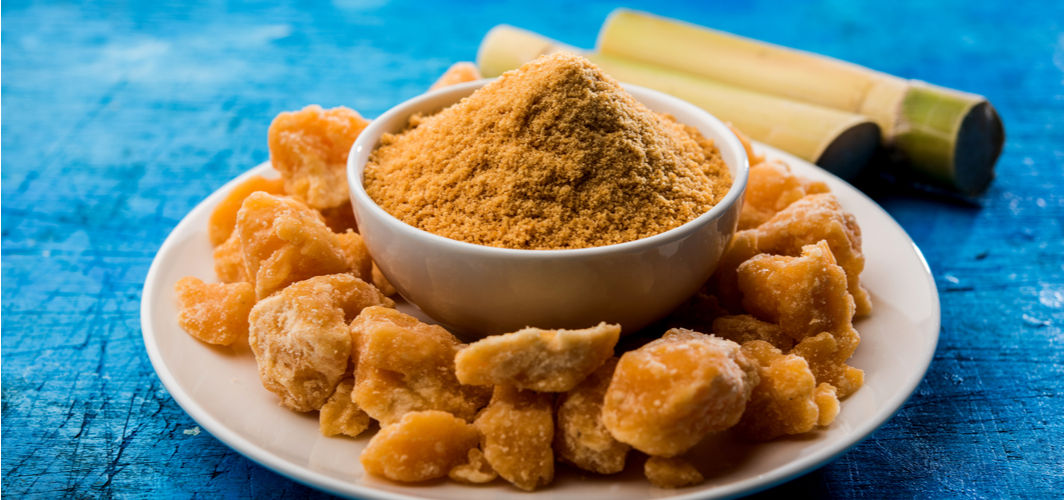Health & Nutrition
Is Jaggery Actually Healthier than Sugar?
By Apollo Pharmacy, Published on- 04 January 2022, Updated on -12 August 2024
Share this article
0
1 like

Whether it is morning tea or coffee, or a dessert after meals, sweeteners are an essential part of our diets. Sugar and jaggery are two commonly used sweeteners with huge differences in their properties and benefits. Though both are produced from sugarcane, they are processed differently. While sugar loses all its nutritional value during the preparation, jaggery retains its nutritional value. Jaggery is considered a superfood as it contains more vitamins and minerals and has low sucrose content when compared to white sugar. Jaggery is gaining popularity because it is more nutritious than sugar and offers various health benefits. 
Why is jaggery healthier than sugar?
- Jaggery contains more nutrients: Jaggery is the unrefined sugar prepared from concentrated sugarcane juice. The molasses are not separated to prepare jaggery, as in the case of sugar. Hence, jaggery has more mineral content, mainly iron. While most of the iron in jaggery comes through its preparation in iron vessels, other minerals like calcium, potassium, magnesium, manganese, zinc, and selenium come from sugarcane juice. On the other hand, refined white sugar undergoes more processing steps due to which the cane juices are deprived of their vitamin and mineral content.
- Jaggery is absorbed slowly: Jaggery is a complex sugar with long chains of sucrose. Therefore, it is digested slowly unlike sugar, which is absorbed instantly causing a rapid spike in blood sugar levels.
- Jaggery fulfils the iron requirement of the body: Jaggery is one of the best sources of plant-based iron, vital for improving muscular function and boosting energy.
- Jaggery prevents weight gain: Jaggery can boost the metabolism, which in turn helps burn fat around the belly faster. Whereas sugar induces sudden blood sugar spikes leading to weight gain.
- Jaggery boosts immunity: Jaggery is packed with antioxidants that aid in building immunity and lowering the risk of certain diseases like cancer and dementia. Antioxidants in jaggery are also known to reduce the signs of aging. Sugar, on the other hand, is a source of empty calories with no nutritional value.
- Jaggery is helpful in treating cold and infections: Jaggery’s cleansing and anti-allergic properties can eliminate toxins and mucus out of the lungs and respiratory tract. It thereby helps treat cold, cough, and asthma. However, sugar has no such properties.
Health effects of sugar
Eating too much sugar can contribute to weight gain, tiredness, and acne. Overconsumption of sugar can also increase the risk of chronic conditions such as type 2 diabetes and heart problems.
Other health benefits of jaggery
- Aids digestion
- Flushes out toxins from the liver
- Purifies the blood
- Fights lung and respiratory infections
- Relieves constipation
- Produces heat and increases energy levels
- Eases premenstrual syndrome (PMS)
- Possesses antioxidant and anti-carcinogenic properties
Although jaggery is nutritious than sugar, it should be consumed in small quantities due to its high-calorie content. People with diabetes are recommended to avoid jaggery as it has a high glycemic index and can cause a sudden spike in sugar levels.
| Calorie Content Per 100 gm | Glycemic Index | |
| Sugar | 385 Calories | 65 |
| Jaggery | 375 Calories | 84.1 |
Conclusion
Research shows that jaggery is superior to white sugar as it provides immediate energy to the body. It has cleansing properties that help clear the lungs and respiratory tract. Other health benefits of jaggery include improved immunity, anaemia prevention, and improved digestive health. Experts recommend switching from white or refined sugar to jaggery to enhance immunity and lower the risk of certain diseases.
Services
Health & Nutrition
Leave Comment
Services
Recommended for you

Health & Nutrition
The Power Of A Balanced Diet: A Guide To Nutritional Wellness
This article explains what is a balanced diet and how to achieve it. It suggests including a variety of foods from different groups, controlling portion sizes, reading food labels, and staying hydrated. A balanced diet can prevent diseases, help manage weight, and give us more energy and clarity.

Health & Nutrition
10 Ways to Keep Your Heart Young and Healthy
It's no secret that heart health is important. In fact, it's something that we should all be thinking about on a daily basis. After all, our heart is responsible for pumping blood throughout our body. Not to mention, heart disease is the leading cause of death in the world. So, how can we keep our heart healthy and young? Here are 10 simple ways!

Health & Nutrition
Ways to Take Care of Inflamed Winter Sinuses
Winter is many people's favorite season, but it also comes with a set of Dos and Don'ts to avoid illness. The air becomes extremely dry during this time, and our respiratory system, skin, and lips suffer as a result of the lack of moisture in the air. But do you suffer from a stuffy nose that just won't go away? Chances are, that you may be suffering from Sinusitis.
Subscribe
Sign up for our free Health Library Daily Newsletter
Get doctor-approved health tips, news, and more.
